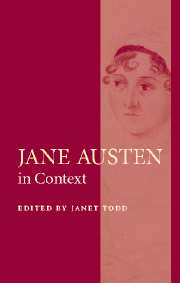29 - Money
Published online by Cambridge University Press: 19 December 2020
Summary
Money in Jane Austen's novels has an uncanny way of seeming so much like our own that we run the serious mistake of thinking that it is. Everything in the Austen novels seems to add up at the cash register in the usual way – the pianos, shawls, muslins, carriages and horses – so familiar that we think we are in the same world. We are not. The Austen fictional economy draws on a real economy in a state of rapid and unsettling transition: an expanding commercial sector, a rapidly developing consumer culture, an economy tied to the ups and downs of foreign wars, high taxes, scarce capital, inadequate banking and credit systems and large sums of money to be made and spent by those who never had it before. Aggressive enclosures of common lands, consolidation of neighbouring farms and the introduction of modern agricultural improvements had brought enormous wealth and power to the great landholders. These conspicuous and deeply felt changes in the distribution and management of wealth were made even more acute by an unheard of rate of inflation in prices, punctuated by periodic economic depression. In this unstable economy, marriage, Austen's narrative mainstay, was a legitimate and common means of gaining access to all-important capital.
People without money, or living on fixed incomes, or tied to older patriarchal systems of financial support were in big trouble, or so it seemed in the 1790s when Austen's first three novels, Sense and Sensibility (1795, 1797), Pride and Prejudice (1796–7) and Northanger Abbey (1798–9) were conceived. These early novels share a common economic vision – the danger of losing it all, the chance of hitting it rich, huge losses, huge gains, everything riding on luck and the main chance. Austen's later novels, Mansfield Park (1811– 13), Emma(1814–15) and Persuasion (1815–16) explore much more complex economic fictions, sometimes deeply troubling morally, as Austen reflects more widely on social changes brought about by the economic upheavals of the war years and the following post-war adjustments, a time marked by a decline in agricultural profits, an expansion of the credit economy and the sense, particularly in her last work, the unfinished Sanditon (1817), that the movement of money was the key to the disturbing new shifts in the arrangements of power.
- Type
- Chapter
- Information
- Jane Austen in Context , pp. 317 - 326Publisher: Cambridge University PressPrint publication year: 2005
- 1
- Cited by



